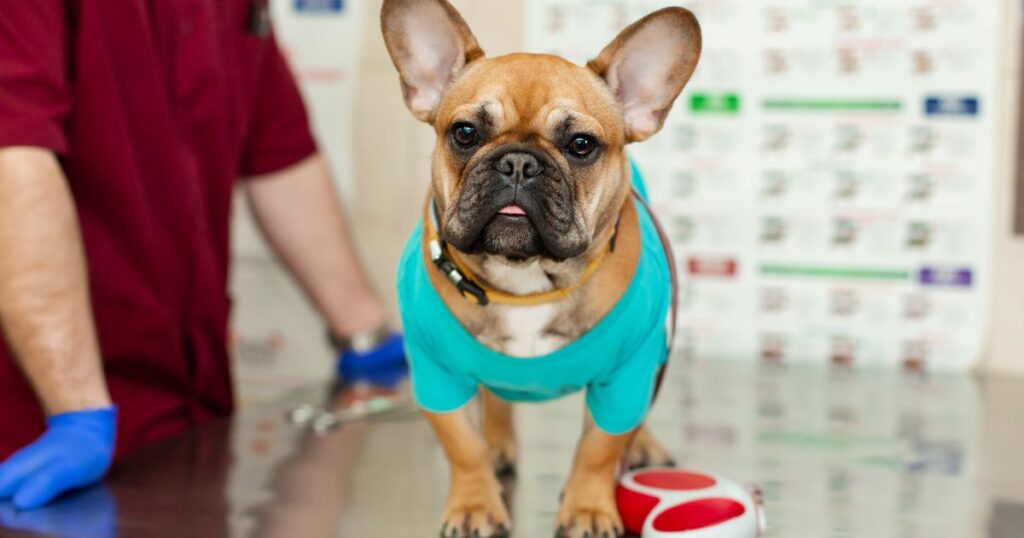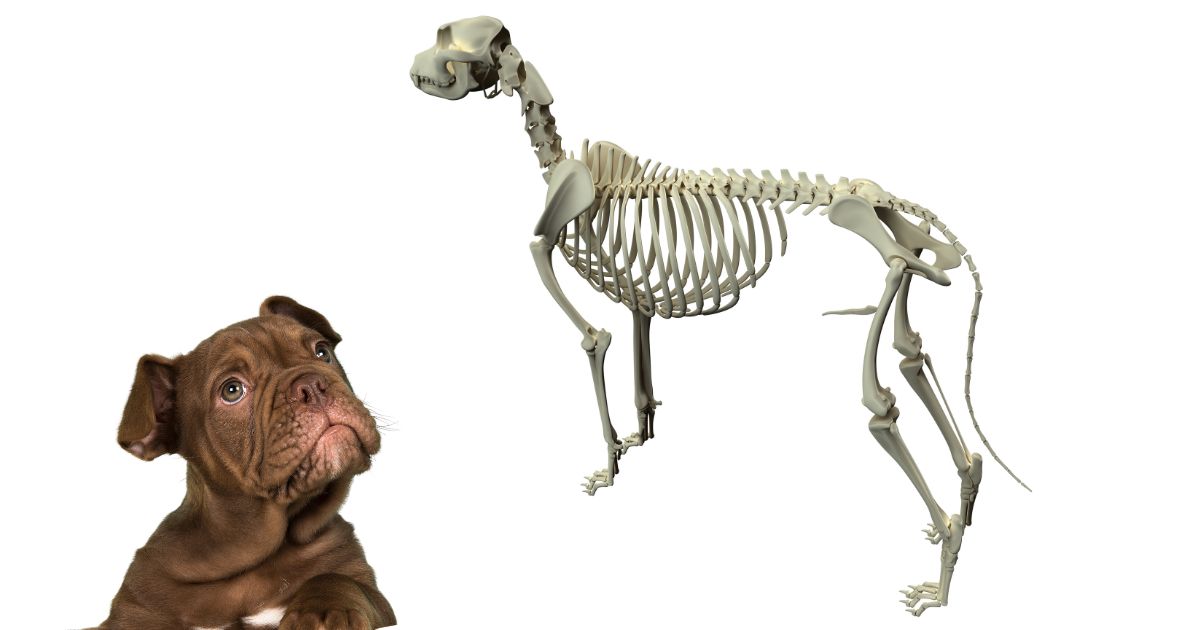French Bulldog Hemivertebrae
Table of Contents
French Bulldog Hemivertebrae
| Symptoms | Description |
|---|---|
| Unsteady Gait | Difficulty in walking or moving around, often appearing wobbly or unstable |
| Difficulty Walking | Struggling to walk or move normally, may appear to be in discomfort |
| Incontinence | Loss of control over bladder or bowel function |
| Paralysis | Loss of ability to move one or more muscles; may include loss of feeling |
Ever wondered why your French Bulldog’s tail is as twisty as a croissant? It’s all down to a condition called ‘hemivertebrae’. Join me as we unravel this curly mystery, exploring its impact on our adorable Frenchies and how we can help them live their best lives!

Introduction
If you’re a proud parent of a French Bulldog, you’ve likely heard of the term ‘hemivertebrae’, a common skeletal deformity in this breed. Hemivertebrae is a condition where one or more vertebrae, the small bones that make up the spinal column, are misshapen. This can lead to a variety of health issues, including spinal cord compression and hind limb dysfunction. In this article, we’ll delve into the world of French Bulldog hemivertebrae, exploring its causes, symptoms, and treatment options.
Understanding this condition is crucial for any French Bulldog owner, as it can significantly impact your pet’s quality of life. Knowledge is power, and being well-informed about hemivertebrae can help you provide the best care for your beloved Frenchie.
The bond with a true dog is as lasting as the ties of this earth will ever be.
Understanding Hemivertebrae
Let’s start by understanding what hemivertebrae is and why it’s often associated with our beloved French Bulldogs. Hemivertebrae is a congenital condition, meaning it’s present at birth. It occurs when one or more of the vertebrae in the spine develop abnormally, causing them to be wedge-shaped instead of rectangular. This abnormal shape can cause the spine to twist or curve, leading to a condition known as screw-tail.
In French Bulldogs, hemivertebrae is a common occurrence due to their unique skeletal structure. The breed’s characteristic short, stubby tail is actually a result of this condition. While it might add to their charm, it’s important to understand the potential health implications it can have.
5 Things to Know About Hemivertebrae
- It’s a congenital condition, meaning it’s present at birth
- It’s more common in brachycephalic breeds like French Bulldogs
- It can range from mild to severe, with symptoms varying accordingly
- Early diagnosis and treatment can significantly improve the prognosis
- With appropriate care, many dogs with hemivertebrae can lead happy, fulfilling lives
The Connection Between French Bulldogs and Hemivertebrae
The term ‘screw-tail’ is often used to describe the cute, curly tail of a French Bulldog, but did you know it’s actually a result of hemivertebrae? The breed’s distinctive tail is due to the presence of hemivertebrae in the tail vertebrae, causing it to curl or twist in a screw-like manner.
However, the condition isn’t limited to the tail. Hemivertebrae can occur in any part of the spine, and when it affects the vertebrae in the back, it can lead to serious health issues. These can range from mild discomfort to severe spinal cord compression, which can cause pain and mobility issues.

Recognizing the Symptoms
From wobbliness in the hind limbs to loss of bladder control, let’s delve into the symptoms that might indicate your Frenchie is affected by hemivertebrae. Symptoms can vary widely depending on the severity of the condition and the location of the affected vertebrae. Mild cases might not show any symptoms at all, while severe cases can lead to significant disability.
Common symptoms include an unsteady gait, difficulty walking, incontinence, and in severe cases, paralysis. If you notice any of these symptoms in your Frenchie, it’s important to seek veterinary care immediately. Early diagnosis and treatment can significantly improve the prognosis and quality of life for dogs with hemivertebrae.
Top 5 Signs Your French Bulldog Might Have Hemivertebrae
- Unsteady or wobbly gait
- Difficulty walking or moving around
- Loss of bladder or bowel control
- Weakness or paralysis in the hind limbs
- Pain or discomfort, especially in the back or tail area
Diagnosis and Treatment
Diagnosing hemivertebrae involves a thorough examination and specific tests, but the good news is, there are treatment options available to help manage this condition. Diagnosis typically involves a physical examination, neurological examination, and imaging tests such as x-rays or an MRI to visualize the spine and identify any abnormalities.
Treatment options depend on the severity of the condition and the symptoms your Frenchie is experiencing. Mild cases might not require any treatment at all, while severe cases may require medication to manage pain and inflammation, physical therapy, or even surgery to correct the spinal deformity. With appropriate treatment and care, many dogs with hemivertebrae can lead happy, fulfilling lives.
Diagnosis Methods for Hemivertebrae
| Method | Description |
|---|---|
| Physical Examination | A vet checks the dog’s physical condition and mobility |
| Neurological Examination | A vet assesses the dog’s nerve function and responses |
| X-Rays | Imaging to visualize the spine and identify any abnormalities |
| MRI | Detailed imaging to assess the condition of the spinal cord and surrounding tissues |

Treatment Options for Hemivertebrae
| Treatment | Description |
|---|---|
| Medication | To manage pain and inflammation |
| Physical Therapy | To improve mobility and muscle strength |
| Surgery | To correct severe spinal deformities |
The Role of Genetics
You might be wondering why French Bulldogs are prone to hemivertebrae, and the answer lies in their genes. Hemivertebrae is a hereditary condition, meaning it’s passed down from parent to offspring through their genes. It’s a common condition in brachycephalic breeds, or breeds with short noses and flat faces, like French Bulldogs, English Bulldogs, Pugs, and Boston Terriers.
This genetic predisposition is one of the reasons why responsible breeding practices are so important. By screening for this and other genetic conditions, breeders can make informed decisions to help reduce the prevalence of these conditions in future generations.
Genetic Factors in Hemivertebrae
| Factor | Description |
|---|---|
| Breed | More common in brachycephalic breeds like French Bulldogs |
| Hereditary | Condition can be passed down from parent to offspring |
| Breeding Practices | Responsible breeding can help reduce the prevalence of the condition |

The Impact on Quality of Life
While hemivertebrae can pose challenges, it doesn’t mean your Frenchie can’t enjoy a good quality of life. With appropriate care and management, many dogs with this condition can lead happy, active lives. It’s important to work closely with your vet to develop a care plan tailored to your pet’s specific needs.
In some cases, modifications to your home environment may be necessary to accommodate your pet’s mobility needs. This might include providing ramps to help your pet navigate stairs, or using supportive harnesses to assist with walking. Regular check-ups and monitoring are also crucial to ensure your pet’s condition is managed effectively.
5 Questions to Ask Your Vet About Hemivertebrae
- What are the treatment options for my dog?
- How can I make my home more comfortable for my dog?
- What signs of discomfort should I watch out for?
- How can I help my dog stay active and healthy?
- What can I do to support my dog’s overall well-being?
Animal Welfare Considerations
As responsible pet parents and advocates for animal welfare, it’s important to understand the implications of breed-specific health issues like hemivertebrae. While we love our French Bulldogs for their unique characteristics, it’s crucial to remember that these traits can sometimes come with health challenges.
Promoting responsible breeding practices, supporting research into these conditions, and educating others about these issues are all ways we can contribute to improving the welfare of French Bulldogs and other brachycephalic breeds. After all, every dog deserves a chance at a happy, healthy life.
5 Ways to Support a French Bulldog with Hemivertebrae
- Regular vet check-ups
- Appropriate medication and treatment
- Modifications to home environment for easier mobility
- Regular, gentle exercise
- Lots of love and patience
French Bulldogs are like potato chips…you can’t have just one!

Conclusion
Living with a French Bulldog with hemivertebrae can be a journey filled with challenges, but the love and companionship they offer make every moment worth it. By understanding this condition and how to manage it, you can ensure your Frenchie gets the care they need to live their best life.
Remember, every dog is unique, and what works for one might not work for another. Always consult with your vet to determine the best course of action for your pet. And remember, despite their health challenges, French Bulldogs are full of love, joy, and resilience, and they can teach us a lot about embracing life, no matter the challenges we face.
Disclaimer
The information provided in this article is intended for informational purposes only. It is not a substitute for professional veterinary advice, diagnosis, or treatment. Always seek the advice of your veterinarian with any questions you may have regarding your pet’s health.
If you want to learn more about French Bulldog health and care, check out these articles on French Bulldog Health and Care and French Bulldog health issues.
See also my other pages in this series: French Bulldog Heat Intolerance and French Bulldog Patellar Luxation
Frequently Asked Questions
Can dogs live with Hemivertebrae?
Yes, dogs can live with hemivertebrae. The condition varies in severity, and some dogs may not show any symptoms at all. With appropriate treatment and care, many dogs with hemivertebrae can lead happy, fulfilling lives.
What are the symptoms of Hemivertebrae in dogs?
Symptoms of hemivertebrae in dogs can include an unsteady gait, difficulty walking, incontinence, and in severe cases, paralysis. However, symptoms can vary widely depending on the severity of the condition and the location of the affected vertebrae.
What is the prognosis for a dog with Hemivertebrae?
The prognosis for a dog with hemivertebrae depends on the severity of the condition and the dog’s overall health. Early diagnosis and treatment can significantly improve the prognosis. With appropriate care, many dogs with this condition can lead happy, active lives.
How is Hemivertebrae treated?
Treatment options for hemivertebrae depend on the severity of the condition and the symptoms your dog is experiencing. Mild cases might not require any treatment at all, while severe cases may require medication to manage pain and inflammation, physical therapy, or even surgery to correct the spinal deformity.
What are the symptoms of Hemivertebrae in French bulldogs?
In French Bulldogs, symptoms of hemivertebrae can include an unsteady or wobbly gait, difficulty walking, loss of bladder or bowel control, and in severe cases, paralysis. If you notice any of these symptoms in your Frenchie, it’s important to seek veterinary care immediately.
Is hemivertebra serious?
Hemivertebra can be serious, particularly if it leads to spinal cord compression. This can cause pain and mobility issues, and in severe cases, can lead to paralysis. However, with early diagnosis and appropriate treatment, many dogs with hemivertebrae can lead happy, fulfilling lives.
Does hemivertebrae require surgery?
Whether hemivertebrae requires surgery depends on the severity of the condition and the symptoms your dog is experiencing. In severe cases where the spinal cord is being compressed, surgery may be necessary to correct the spinal deformity and relieve pressure on the spinal cord.
Do all French bulldogs have spine problems?
Not all French Bulldogs have spine problems, but the breed is prone to certain spinal conditions like hemivertebrae due to their unique skeletal structure. It’s important for French Bulldog owners to be aware of these potential health issues and to seek regular veterinary care for their pets.
Why do French Bulldogs get paralyzed?
Paralysis in French Bulldogs can be due to a variety of health issues, including hemivertebrae. This condition can cause spinal cord compression, which can lead to paralysis in severe cases. If you notice any signs of paralysis in your Frenchie, such as difficulty walking or loss of bladder or bowel control, it’s important to seek veterinary care immediately.






